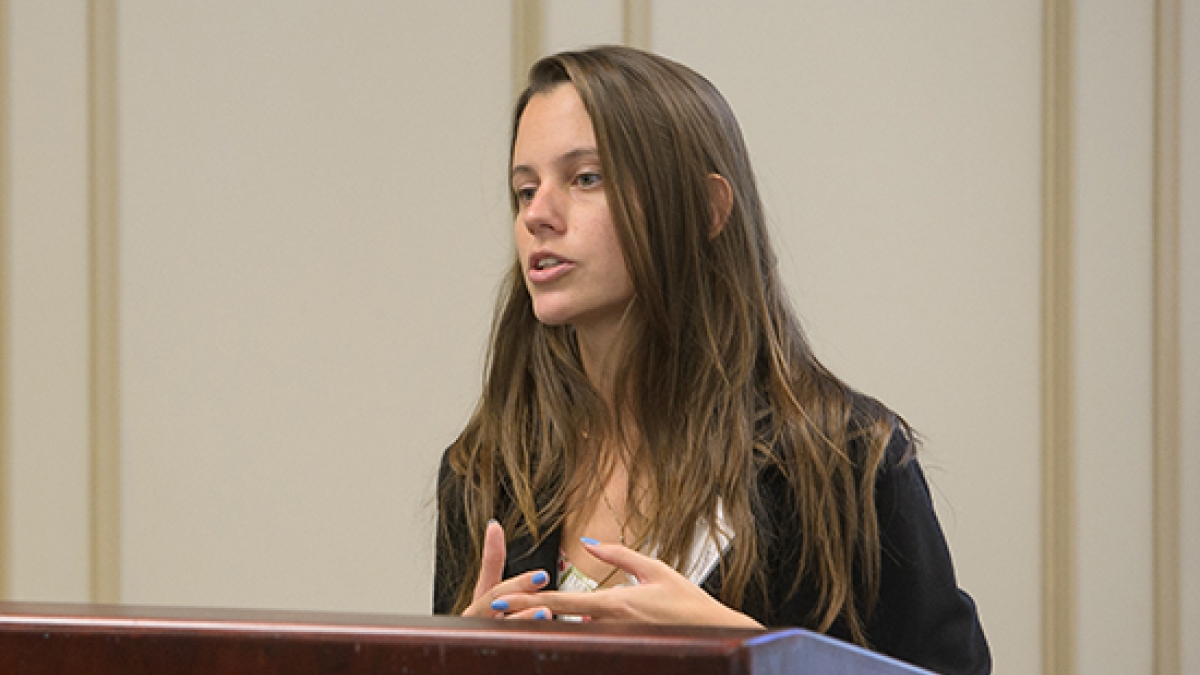ASU students receive scholarships for international research on religion, conflict

Why does wartime rape vary both within and across conflicts? What role have religious leaders played in peacebuilding efforts in Latin America? How can we improve our understanding of the differences between religious and ethnic factors in conflicts around the world?
These are some of the questions that recipients of the Center for the Study of Religion and Conflict’s prestigious Friends of the Center research scholarships are exploring overseas this summer. The Friends of the Center awards are granted annually to support undergraduate and graduate students pursuing research on religion, conflict and peace studies.
The Center for the Study of Religion and Conflict recently hosted its annual student luncheon to celebrate these award recipients, and to acknowledge the incredible work of ASU students who are investigating the complex dynamics between religion and conflict.
“Through our research awards, the center has an opportunity to help students travel around the world and work on a diverse range of projects,” says Linell Cady, director of the center and professor of religious studies.
“These scholarships are made possible by the generous donations we receive from private individuals who are committed to advancing the center’s research and education programs.”
The 2014 winners of the Friends of the Center awards include one undergraduate: Emily Fritcke; and three graduate students: Lucia Cash, A.J. Simmons and Holly Williamson.
Fritcke and Cash’s research projects both focus on the religious dynamics of countries that have experienced major political shifts.
Fritcke, an honors student in Barrett, the Honors College, is double-majoring in English literature and history. She will spend part of her summer in Romania with Ileana Orlich, professor of Romanian studies and comparative literature and director of the Romanian program at ASU. Fritcke will examine the conflict between the Orthodox Church and Greek Catholics of eastern Romania, and she will have the opportunity to visit historic sites and engage with experts on her research.
Cash, a doctoral student in religious studies, is working on a project that examines the role of Uruguayan religious leaders during the country’s period of dictatorship and its transition to democratic rule. Even though over half of Uruguay’s population is Christian, it is the most secular country in Latin America. Because of this, few people have studied the period of the Uruguayan dictatorship in relation to the country’s religious institutions. Cash is using her award to travel to Uruguay for two months to collect research materials from public libraries and other sources only available in Uruguay.
The two other award recipients, Williamson and Simmons, are both doctoral students in ASU’s School of Politics and Global Studies. Each of them is conducting research about religious and ethnic factors in modern conflicts.
Williamson is using her award to spend three weeks in Bosnia. She will conduct interviews with religious organizations, NGOs, local experts, community members and combatants involved in the Bosnian war in order to develop an understanding of the nature and effects of wartime rape. More specifically, she will explore how religious, ethnic and national identities have been mobilized in military operations to justify rape. In doing this, she hopes to conduct some of the research that is needed to understand how these identities may have been invoked to unify combatants to justify rape as a military strategy.
Simmons’ project builds on literature concerning the origins and dynamics of religious and ethnic conflict by investigating differences in their duration and intensity. He hopes to expand understandings of the systematic differences between religious and ethnic factors. Improving these types of data could help people more effectively manage conflicts by focusing on the issues that matter most in different disputes.
Each of the award winners will report back to the center in the fall with reflections on their summer research and the future of their projects.
In addition to presenting the 2014 Friends of the Center research scholarships at the awards lunch, the center also recognized students who completed the 2013-14 undergraduate research fellows program and those who were awarded the 2013-2014 certificates in religion and conflict.
Story by Matt Correa and Emily Fritcke
The Center for the Study of Religion and Conflict is a research unit of the College of Liberal Arts and Sciences that examines the role of religion as a driving force in human affairs.